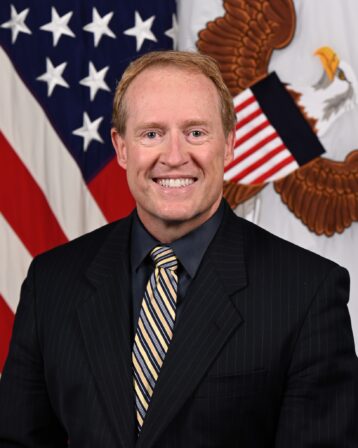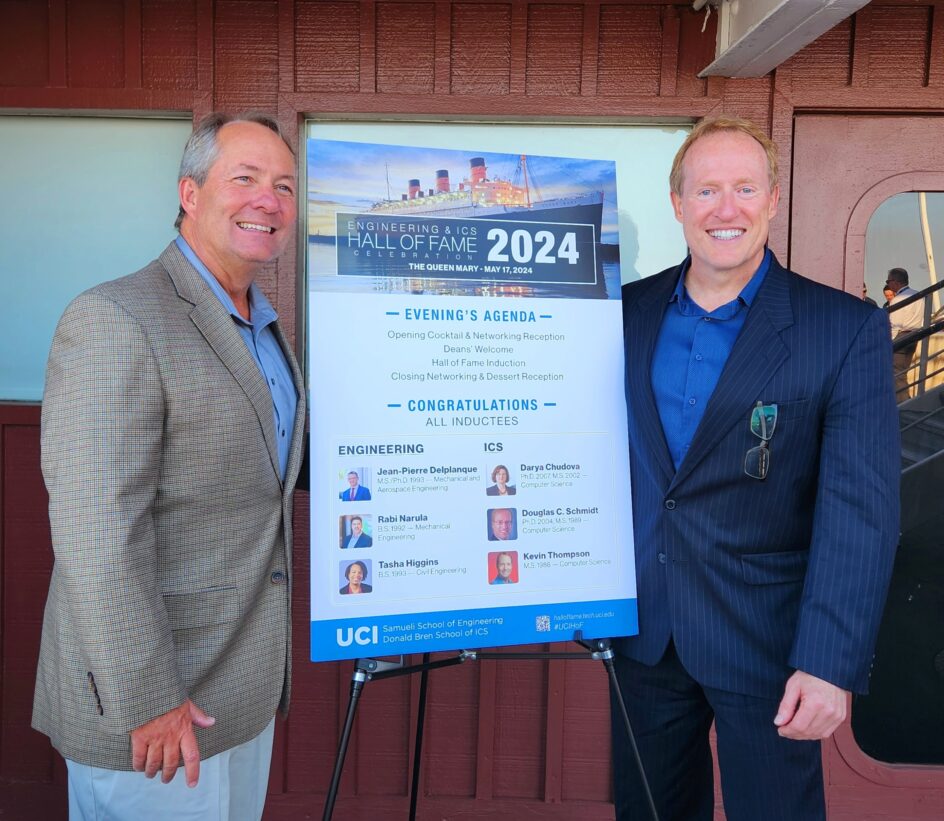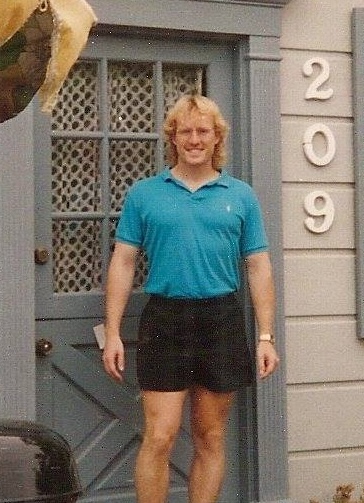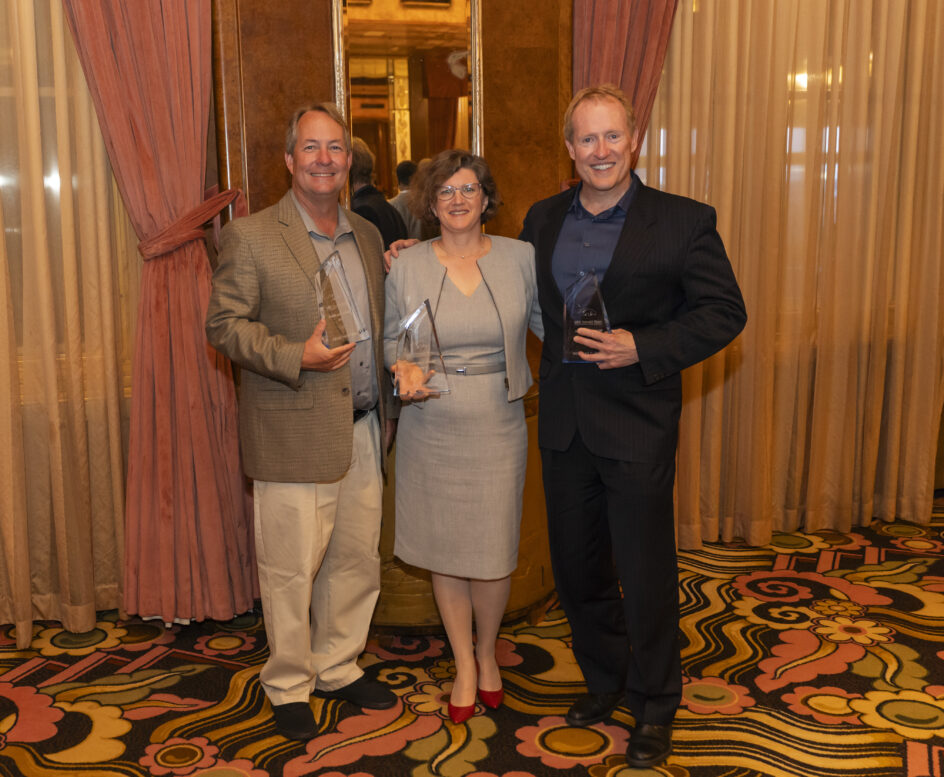Alumni Spotlight: Douglas Schmidt’s Unique Career Path to Protecting the U.S.

As a sociology student in the 1980s, there was no way of knowing that Douglas C. Schmidt would go on to become a leader in software engineering, taking on roles in academia, industry and government. Today, Schmidt is the Director of Operational Test and Evaluation (DOT&E) for the United States Department of Defense, assessing hundreds of systems, ranging from business systems to space satellites. This is a departure from his work at Vanderbilt University, where he is currently on leave from his position as the Cornelius Vanderbilt Professor of Computer Science. He stepped into his new role in April, and a month later headed out west. “I’m in Las Vegas about to give a talk at a conference,” said Schmidt, speaking from the Institute for Defense and Government Advancement (IDGA) Air Dominance Summit. His talk focused on cutting-edge technology for helping the U.S. and allied nations establish air superiority.
A few days later, on May 17, 2024, the UC Irvine alumnus was in California being inducted into the Donald Bren School of Information and Computer Sciences (ICS) Hall of Fame. “I lived in California for many years, and I’ve never been to the Queen Mary,” said Schmidt, who found himself on the famed ship, docked in Long Beach, for the 2024 Hall of Fame Celebration. Schmidt, who earned his M.S. and Ph.D. in Computer Science from UCI, was recognized for decades worth of research on a range of software-related topics, including patterns, optimization techniques, and quality assurance of middleware frameworks and model-driven engineering tools for cyber-physical systems and mobile cloud computing applications.

Here, Schmidt talks about his “long and winding” road from earning his bachelor’s and master’s degrees in sociology to assessing software systems to help keep the U.S. and its allies safe.
What first sparked your interest in computer science?
I was a sociology student at the college of William and Mary in Williamsburg, Virginia, and toward the latter part of my time there, I became friends with a bunch of computer science undergraduates. They were very intriguing people, with a broad range of interests, and I became enamored with programming. So I took a couple of computer science courses over the summer, and then just about the time I was graduating with a master’s degree in sociology, I happened to see a poster in the hallway of our department advertising the Computers, Organization, Policy and Society program — called CORPS — at UC Irvine.

Since I was into both sociology and computer programming, I thought, “Gee, that would be kind of fun!” So I applied and somehow managed to get accepted with only a sociology background, and I became a Ph.D. student at UCI, working with very famous people in ICS like John King and the late Rob Kling. As I started that program, I quickly realized that although I like sociology, I liked computer science even more. So about a year into the program, I switched to software engineering, and then I switched later to computer networking.
It was a long and somewhat winding road, but I’m very glad I made the transition. I always tell people that having a computer science Ph.D. helped me in the first half of my career when I was climbing the tenure ladder, but having a sociology degree helped in the second half of my career, where I’ve spent a lot of time working with people and organizations, trying to get things done as groups. So it’s a good combination. It’s also a testament to the inherently interdisciplinary nature of Information and Computer Sciences at UCI.
In addition to your unique academic path, can you also talk a bit about your career path?
Every 5 to 10 years, I like to do something new. In the 1990s, I took some time off between getting my master’s degree at UCI and getting my Ph.D., working in Silicon Valley. Then, in the 2000s, I took time off from being a professor at Vanderbilt University to be a program manager at the Defense Advanced Research Projects Agency. In 2010, I went on to become the Chief Technology Officer at the Software Engineering Institute at Carnegie Mellon University, and then in 2018, I became the Associate Provost for research at Vanderbilt.
This year, I thought it was again time to try something new, so I’m now Director of Operational Test and Evaluation (DOT&E), once again proving the value of a liberal arts education when combined with technology. It prepares you to change your career trajectory many times throughout your professional life.
What have you liked best about your various roles?
The great thing about working in industry and government is being exposed to really hard problems that affect us in many different sectors, such as in healthcare, data and telecommunications, financial services, air traffic management systems, and of course, homeland security and military defense. This is where you learn about today’s most pressing challenges, so when I go back to being a professor, I’m better equipped to attack these hard problems with the appropriate degree of realism, working on solutions that will scale to production-grade applications.
What do you like about your current work?
It’s quite inspiring to get to work with a dedicated workforce that is supporting and protecting our homeland and making systems that are going to be effective, suitable, survivable — and, when necessary, lethal — so that we can keep our country and our allies safe from all the threats, increasing with various degrees of severity, around the world. It’s fascinating to understand how these very large-scale systems are built and then assessed to make sure that they’re actually going to protect our servicemen and women when they’re in harm’s way.
When we build these large systems, we do what’s called “developmental testing,” checking to ensure the systems are going to work relative to their requirements. However, oftentimes with large and complex systems, their requirements evolve over many years. The systems can take decades to get into the field, and during that time, a lot of things can change in the operating environment. It is much different today than it was 5, 10, or 20 years ago, when many of these systems were first envisioned.
So my office at DOT&E is responsible for making sure DoD systems will actually work in the environment that they have to face today or in the near future, rather than just in the world that they were designed to address decades ago.
How has your ICS education helped along the way?
It’s been great. First of all, I met some really fantastic teachers in ICS. Steve Franklin taught me a lot of the introductory and advanced things I needed to know about operating systems, compilers, and system design. I also had the chance of working with some top-notch graduate students, many of whom have gone on to wonderful fame and fortune in a variety of fields in industry, academia and government service — people like Roy Fielding and Don Box.
And, as I mentioned, having the chance to weave together different disciplines, topics and themes was instrumental. I was given a lot of latitude by some fantastic mentors, including Rick Selby, and my Ph.D. advisor Tatsuya Suda taught me to communicate clearly and effectively, which has helped me throughout my entire career. Someone once said that the key to success in computer science is the ability to speak well, write well and have great ideas — in that order. Being able to communicate is extremely important, and that’s a lot of what was emphasized by my mentors and teachers at UCI.
Any memorable UCI moments you want to share?
Playing frisbee golf in Aldrich Park! I also have fond memories of sitting out in the courtyard between the ICS and Engineering buildings, playing music with fellow ICS graduate students like Adam Porter, Clark Turner and Kent Madsen. We played in a band together at the time, and there was a coffee house near the Student Center that had live music on certain days of the week, so we would perform there. [Note that Schmidt continues to play; listen to his bass guitar in this recent Chris Isaac cover!]
What was your reaction to learning you were being inducted into the ICS Hall of Fame?
I was very excited. I have many other colleagues and friends who are in the Hall of Fame, and I was very fortunate to get a chance to work with them. Jim Bernie, who has done amazing work in the film and animation industry; Greg Bolcer; and Kevin Thompson, who was inducted into the ICS Hall of Fame along with me this year, are ones who come to mind. So it’s a real honor.

Any words of advice for ICS students?
The most important advice I can give is to students working toward their Ph.D. — dig in and finish! I took some time off between getting my master’s in computer science from ICS and getting my Ph.D., and it was invaluable because it taught me the importance of pushing through and wrapping up my dissertation. At that point, I was trying to decide what I wanted to do with my life, and looking back, I’m grateful I returned to UC Irvine to complete my Ph.D. So many things would not have occurred had I not had a Ph.D. in computer science. I would have had a much harder time becoming a successful computer science professor, a program manager at DARPA, the Chief Technology Officer at the Software Engineering Institute, as well as so many other opportunities that came along because I took the time to invest in my future.
I know it’s tempting to get off the hamster wheel and take a high paying job with an undergraduate or even master’s degree in computing, but lots of unexpectedly wonderful things will come down the pike if you’re willing to take the time and stick with it. I therefore encourage ICS students to reach that Ph.D. milestone!
— Shani Murray